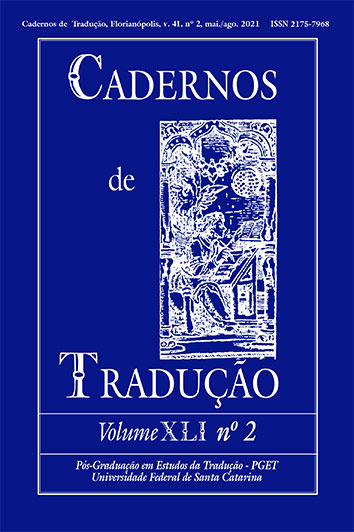Traduzir para não entender: sobre o multilinguismo no teatro atual
DOI:
https://doi.org/10.5007/2175-7968.2021.e74045Abstract
Partindo da premissa de que a coexistência de diferentes línguas é um fenômeno presente no teatro desde seus primórdios e que pode ser apresentada ao público de modos diferentes, este artigo examina duas montagens teatrais atuais, ambas explorando formas inovadoras de exibir o multilinguismo. Nos dois casos, os diretores optaram por traduzir peças originalmente escritas em uma única língua para outras línguas ou variantes linguísticas, no intuito de criar um estranhamento ou reforçar a sensação de não compreensão. O artigo descreve consequências desse cenário multilíngue para a tradução e a recepção de peças teatrais.
Literaturhinweise
Affenzeller, Margarete. “Schräg: ‚König Ottokars Glück und Ende‘ im Volkstheater”. Der Standard (9 de janeiro de 2019). Web 6 mai 2020. https://www.derstandard.at/story/2000095786917/schraeg-koenig-ottokars-glueck-und-ende-im-volkstheater
Baur, Detlev. “Reise nach Jerusalem. Wajdi Mouawad: Vögel”. (16 de novembro de 2018). Web 3 fev 2020. https://www.die-deutsche-buehne.de/kritiken/reise-nach-jerusalem
Behrens, Marcus. “Theater als Form des Angriffs? Für Wajdi Mouawad reise ich auch nach Paris”. 2019. Web 3 fev 2020. https://www.theaterbremen.de/de_DE/theater-als-form-des-angriffs-fuer-wajdi-mouawad-reise-ich-auch-nach-paris
Bernardes, Everton Mitherhofer. Língua, xenofobia e barbárie: uma proposta de tradução para a trilogia “O Velo de Ouro” de Franz Grillparzer. 2019. 116f. Monografia (Bacharelado em Letras - Português e Alemão). Universidade Federal do Paraná, Curitiba, 2019. Web. 6 abr. 2020. http://www.humanas.ufpr.br/portal/letrasgraduacao/curriculos/monografias/monografias-2019/
Conter, Claude D. “Dramatik/Theater”. Dembeck, Till; Parr, Rolf (org.). Literatur und Mehrsprachigkeit. Ein Handbuch. Tübingen: Narr Francke, 2017, p. 277-289.
Davis, Natalie Zemon. Trickster Travels: A Sixteenth-Century Muslim Between Worlds. New York: Hill and Wang, 2007.
Dembeck, Till e Uhrmacher, Anne (org.). Das literarische Leben der Mehrsprachigkeit. Methodische Erkundungen. Heidelberg: Universitätsverlag Winter, 2016.
Griesel, Yvonne. Welttheater verstehen – Übertitelung, Übersetzen, Dolmetschen und neue Wege. Berlin: Alexander, 2014.
Kerlin, Alexander. “Identität – Sprache. Zusammengestellt von Alexander Kerlin”, Vögel Programa publicado em ocasião da estreia da peça em 13 de setembro de 2019. Viena: Akademietheater, 2019, p. 16-30.
Koberg, Roland. “Verlangen nach Volksnähe: Dušan David Pařízek im Gespräch mit Roland Koberg”. König Ottokars Glück und Ende. Programa publicado em ocasião da estreia da peça em 8 de janeiro de 2019. Viena: Volksheater, 2019.
Magris, Claudio. Der habsburgische Mythos in der modernen österreichischen Literatur. Wien: Zsolney, 2000.
Mouawad, Wajdi. Vögel. Tradução de Uli Menke. Frankfurt am Main: Verlag der Autoren, 2018.
Downloads
Veröffentlicht
Zitationsvorschlag
Ausgabe
Rubrik
Lizenz
Copyright (c) 2021 Cadernos de Tradução

Dieses Werk steht unter der Lizenz Creative Commons Namensnennung 4.0 International.
Autores têm autorização para assumir contratos adicionais separadamente, para distribuição não exclusiva da versão do trabalho publicada nesta revista (ex.: publicar em repositório institucional ou como capítulo de livro, com reconhecimento de autoria e publicação inicial nesta revista).






















































